Addition polymer - Study guides, Revision notes & Summaries
Looking for the best study guides, study notes and summaries about Addition polymer? On this page you'll find 495 study documents about Addition polymer.
Page 3 out of 495 results
Sort by
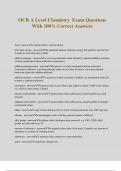
-
OCR A Level Chemistry Exam Questions With 100% Correct Answers
- Exam (elaborations) • 11 pages • 2024
-
- £10.25
- + learn more
OCR A Level Chemistry Exam Questions With 100% Correct Answers Acid - answerA species that is a proton donor. activation energy - answerThe minimum amount of kinetic energy that particles need to have in order to react when they collide addition polymer - answerA very long molecular chain formed by repeated addition reactions of many unsaturated alkene molecules (monomers). addition polymerisation - answerThe process in which unsaturated alkene molecules (monomers) add on to a growing po...
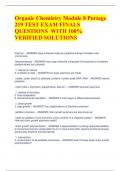
-
Organic Chemistry Module 8 Portage 219 TEST EXAM FINALS QUESTIONS WITH 100% VERIFIED SOLUTIONS
- Exam (elaborations) • 15 pages • 2024
-
- £10.66
- + learn more
Organic Chemistry Module 8 Portage 219 TEST EXAM FINALS QUESTIONS WITH 100% VERIFIED SOLUTIONS Polymer - ANSWER large molecule made by repetitive linking of smaller units (monomers) Macromolecule - ANSWER very large molecule composed of thousands of covalently bonded atoms (ex: polymer) 1. natural (in nature) 2. synthetic (in lab) - ANSWER two ways polymers are made rubber, carbs: starch & cellulose, proteins, nucleic acids DNA, RNA - ANSWER natural polymers nylon, teflon, sty...

-
OCR A Level Chemistry UPDATED Exam Questions and CORRECT Answers
- Exam (elaborations) • 15 pages • 2024
-
- £6.97
- + learn more
acidA species that is a proton donor. activation energyThe minimum amount of kinetic energy that particles need to have in order to react when they collide addition polymerA very long molecular chain formed by repeated addition reactions of many unsaturated alkene molecules (monomers). addition polymerisationThe process in which unsaturated alkene molecules (monomers) add on to a growing polymer chain one at a time to form a very long saturated molecular chain (the addition polymer). ...

-
OCR 2023 GCSE CHEMISTRY B TWENTY FIRST CENTURY SCIENCE J258/02: DEPTH IN CHEMISTRY (FOUNDATION TIER) QUESTION PAPER & MARK SCHEME (MERGED)
- Exam (elaborations) • 49 pages • 2024
- Available in package deal
-
- £6.56
- + learn more
2 © OCR 2023 1 Poly(ethene) is a polymer which forms when ethene monomers react together in an addition polymerisation reaction. The structure of an ethene monomer and the repeating unit of poly(ethene) are shown in Fig. 1.1. Fig. 1.1 H H H H C C C C H H H H Ethene monomer Repeating unit of poly(ethene) (a) Which statements are true only for an ethene monomer, which are true only for the repeating unit of poly(ethene) and which are true for both? Tick () one box in each row. Tru...
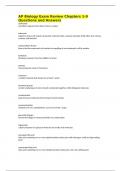
-
AP Biology Exam Review Chapters 1-9 Questions and Answers
- Exam (elaborations) • 8 pages • 2024
-
- £8.53
- + learn more
AP Biology Exam Review Chapters 1-9 Questions and Answers prokaryote unicellular organism that doesn't have a nucleus eukaryote organism whose cell contains its genetic material inside a nucleus (includes all life other than viruses, archaea, and bacteria) endosymbiosis theory theory that the eukaryotic cell evolved via engulfing of one prokaryotic cell by another hydrolysis breaking a polymer from the addition of water polymer macromolecule made of monomers monom...
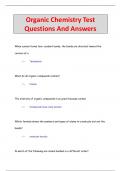
-
Organic Chemistry Test Questions And Answers
- Exam (elaborations) • 14 pages • 2024
- Available in package deal
-
- £9.43
- + learn more
Isomer ~ one of two or more compounds that have the same chemical composition but different structures Polymer ~ a large molecule that is formed by more than five monomers, or small units Copolymer ~ a polymer made from two or more different monomers addition polymer ~ a polymer formed by addition reactions between monomers that contain a double bond condensation polymer ~ a polymer formed by condensation reactions For condensation reaction, look at ~ alcohol and ether...

-
Module 8 Portage 219 Organic Chemistry Questions and Answers | Latest Update
- Exam (elaborations) • 25 pages • 2024
-
- £10.25
- + learn more
Polymer large molecule made by repetitive linking of smaller units (monomers) Macromolecule very large molecule composed of thousands of covalently bonded atoms (ex: polymer) 1. natural (in nature) 2. synthetic (in lab) two ways polymers are made rubber, carbs: starch & cellulose, proteins, nucleic acids DNA, RNA natural polymers nylon, teflon, styrofoam, polyethylene, Dacron, synthetic polymers 2 0 2 4 /2025 | © copyright | This work may not be copied for profit gain Excel! ...
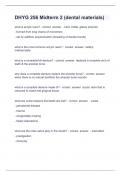
-
DHYG 256 Midterm 2 Question and answer correctly solved 2024
- Exam (elaborations) • 18 pages • 2024
- Available in package deal
-
- £12.30
- + learn more
DHYG 256 Midterm 2 Question and answer correctly solved 2024what is acrylic resin? - correct answer - hard, brittle, glassy polymer - formed from long chains of monomers - set by addition polymerization (breaking of double bonds) what is the most common acrylic resin? - correct answer methyl methacrylate what is a complete/full denture? - correct answer replaces a complete arch of teeth & the alveolar bone why does a complete denture replace the alveolar bone? - correct answer...
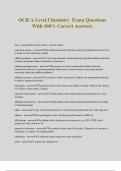
-
OCR A Level Chemistry Exam Questions With 100% Correct Answers
- Exam (elaborations) • 11 pages • 2024
-
- £10.25
- + learn more
OCR A Level Chemistry Exam Questions With 100% Correct Answers Acid - answerA species that is a proton donor. activation energy - answerThe minimum amount of kinetic energy that particles need to have in order to react when they collide addition polymer - answerA very long molecular chain formed by repeated addition reactions of many unsaturated alkene molecules (monomers). addition polymerisation - answerThe process in which unsaturated alkene molecules (monomers) add on to a growing po...
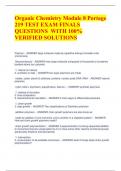
-
Organic Chemistry Module 8 Portage 219 TEST EXAM FINALS QUESTIONS WITH 100% VERIFIED SOLUTIONS
- Exam (elaborations) • 15 pages • 2024
-
- £11.89
- + learn more
Organic Chemistry Module 8 Portage 219 TEST EXAM FINALS QUESTIONS WITH 100% VERIFIED SOLUTIONS Polymer - ANSWER large molecule made by repetitive linking of smaller units (monomers) Macromolecule - ANSWER very large molecule composed of thousands of covalently bonded atoms (ex: polymer) 1. natural (in nature) 2. synthetic (in lab) - ANSWER two ways polymers are made rubber, carbs: starch & cellulose, proteins, nucleic acids DNA, RNA - ANSWER natural polymers nylon, teflon, sty...

Did you know that on average a seller on Stuvia earns £76 per month selling revision notes? Hmm, hint, hint. Discover all about earning on Stuvia


